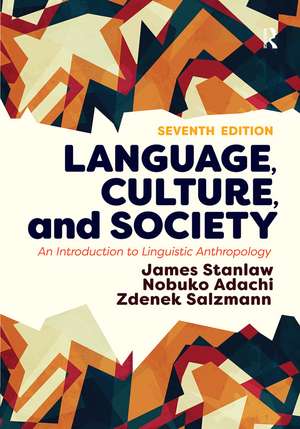Language, Culture, and Society: An Introduction to Linguistic Anthropology
Autor James Stanlaw, Nobuko Adachi, Zdenek Salzmannen Limba Engleză Hardback – 14 mai 2019
| Toate formatele și edițiile | Preț | Express |
|---|---|---|
| Paperback (1) | 386.88 lei 3-5 săpt. | +32.91 lei 4-10 zile |
| Taylor & Francis – 25 iul 2017 | 386.88 lei 3-5 săpt. | +32.91 lei 4-10 zile |
| Hardback (1) | 1000.27 lei 6-8 săpt. | |
| Taylor & Francis – 14 mai 2019 | 1000.27 lei 6-8 săpt. |
Preț: 1000.27 lei
Preț vechi: 1219.84 lei
-18% Nou
Puncte Express: 1500
Preț estimativ în valută:
191.43€ • 199.11$ • 158.03£
191.43€ • 199.11$ • 158.03£
Carte tipărită la comandă
Livrare economică 14-28 aprilie
Preluare comenzi: 021 569.72.76
Specificații
ISBN-13: 9780367319359
ISBN-10: 0367319357
Pagini: 464
Dimensiuni: 178 x 254 x 28 mm
Greutate: 0.45 kg
Ediția:7th edition
Editura: Taylor & Francis
Colecția Routledge
Locul publicării:Oxford, United Kingdom
ISBN-10: 0367319357
Pagini: 464
Dimensiuni: 178 x 254 x 28 mm
Greutate: 0.45 kg
Ediția:7th edition
Editura: Taylor & Francis
Colecția Routledge
Locul publicării:Oxford, United Kingdom
Public țintă
UndergraduateCuprins
Preface
1. Introducing Linguistic Anthropology
2. Methods of Linguistic Anthropology
3. The "Nuts and Bolts" of Linguistic Anthropology I: Language Is Sound
4. The "Nuts and Bolts" of Linguistic Anthropology II: Structure of Words and Sentences
5. Communicating Nonverbally
6. The Development and Evolution of Language: Language Birth, Language Growth, and Language Death
7. Acquiring and Using Language(s): Life with First Languages, Second Languages, and More
8. Language Through Time
9. Languages in Variation and Languages in Contact
10. The Ethnography of Communication
11. Culture as Cognition, Culture as Categorization: Meaning and Language in the Conceptual World
12. Language, Culture, and Thought
13. Language, Identity, and Ideology I: Variations in Gender
14. Language, Identity, and Ideology II: Variations in Class, "Race," Ethnicity, and Nationality
15. The Linguistic Anthropology of a Globalized and Digitalized World
1. Introducing Linguistic Anthropology
2. Methods of Linguistic Anthropology
3. The "Nuts and Bolts" of Linguistic Anthropology I: Language Is Sound
4. The "Nuts and Bolts" of Linguistic Anthropology II: Structure of Words and Sentences
5. Communicating Nonverbally
6. The Development and Evolution of Language: Language Birth, Language Growth, and Language Death
7. Acquiring and Using Language(s): Life with First Languages, Second Languages, and More
8. Language Through Time
9. Languages in Variation and Languages in Contact
10. The Ethnography of Communication
11. Culture as Cognition, Culture as Categorization: Meaning and Language in the Conceptual World
12. Language, Culture, and Thought
13. Language, Identity, and Ideology I: Variations in Gender
14. Language, Identity, and Ideology II: Variations in Class, "Race," Ethnicity, and Nationality
15. The Linguistic Anthropology of a Globalized and Digitalized World
Notă biografică
James Stanlaw is professor of anthropology at Illinois State University. His areas of interest include linguistic anthropology, cognitive anthropology, language and culture contact, and Japan and Southeast Asia. He is the author of Japanese English: Language and Culture Contact.
Nobuko Adachi is associate professor of anthropology at Illinois State University. Her interests include transnationalism, ethnohistory, and ethnic studies. She is the author of Ethnic Capital in a Japanese Brazilian Commune: Child of Nature.
Zdenek Salzmann is professor emeritus of anthropology at the University of Massachusetts, Amherst. A specialist in Native American languages and folklore, he is the author, with his wife Joy, of Native Americans of the Southwest.
Nobuko Adachi is associate professor of anthropology at Illinois State University. Her interests include transnationalism, ethnohistory, and ethnic studies. She is the author of Ethnic Capital in a Japanese Brazilian Commune: Child of Nature.
Zdenek Salzmann is professor emeritus of anthropology at the University of Massachusetts, Amherst. A specialist in Native American languages and folklore, he is the author, with his wife Joy, of Native Americans of the Southwest.
Recenzii
"Language, Culture, and Society provides comprehensive coverage of the fundamental subfields of linguistic anthropology. The rich variety of examples presented from languages spoken all over the globe allows students to enter the world of working linguistic anthropologists."―Marilyn S. Manley, Rowan University
"A major introduction and overview to the (reborn) field of linguistic anthropology. The book is systematic and very accessible. It covers most of what is relevant in the field, for which it certainly is to be highly recommended."―Applied Linguistics
"Language, Culture, and Society is a welcoming text regardless of the reader's background in linguistic anthropology. Material that is significant in scope and depth is masterfully rendered in digestible yet substantive elements. There is an art to maintaining conceptual rigor while deftly delivering profound ideas in readily grasped writing-an art that Salzmann, Stanlaw, and Adachi possess in great amounts."―William L. Alexander, University of North Carolina
"A major introduction and overview to the (reborn) field of linguistic anthropology. The book is systematic and very accessible. It covers most of what is relevant in the field, for which it certainly is to be highly recommended."―Applied Linguistics
"Language, Culture, and Society is a welcoming text regardless of the reader's background in linguistic anthropology. Material that is significant in scope and depth is masterfully rendered in digestible yet substantive elements. There is an art to maintaining conceptual rigor while deftly delivering profound ideas in readily grasped writing-an art that Salzmann, Stanlaw, and Adachi possess in great amounts."―William L. Alexander, University of North Carolina
Descriere
Why should we study language? How do the ways in which we communicate define our identities? And how is this all changing in the digital world? Since 1993, many have turned to Language, Culture, and Society for answers to questions like those above because of its comprehensive coverage of all critical aspects of linguistic anthropology. This seventh edition carries on the legacy while addressing some of the newer pressing and exciting challenges of the 21st century.
